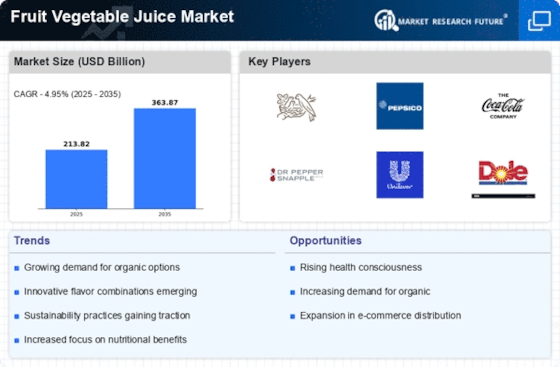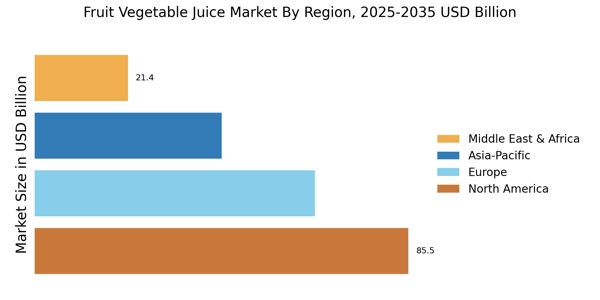Innovative Packaging Solutions
The fruit vegetable juice Market is experiencing a transformation due to innovative packaging solutions. As competition intensifies, brands are exploring new ways to enhance product appeal and convenience. Eco-friendly packaging options, such as biodegradable materials and recyclable containers, are gaining traction among environmentally conscious consumers. Additionally, advancements in packaging technology are enabling longer shelf life and better preservation of nutrients. This shift not only meets consumer preferences for sustainability but also addresses logistical challenges faced by manufacturers. Data indicates that brands adopting innovative packaging solutions are likely to see increased market share as they resonate with the values of modern consumers. Thus, the Fruit Vegetable Juice Market is evolving to incorporate these advancements.
Expansion of Distribution Channels
The Fruit Vegetable Juice Market is benefiting from the expansion of distribution channels. With the rise of e-commerce and online grocery shopping, consumers have greater access to a variety of juice products. This trend is supported by data showing that online sales of beverages, including fruit and vegetable juices, have surged in recent years. Retailers are also diversifying their offerings by including juices in convenience stores, health food shops, and supermarkets. This increased accessibility is likely to drive sales and enhance brand visibility. As a result, companies within the Fruit Vegetable Juice Market are strategically aligning their distribution strategies to capitalize on these emerging opportunities, ensuring that their products reach a wider audience.
Rising Demand for Nutritional Beverages
The Fruit Vegetable Juice Market is experiencing a notable increase in demand for nutritional beverages. Consumers are increasingly seeking products that offer health benefits, such as vitamins, minerals, and antioxidants. This trend is driven by a growing awareness of the importance of nutrition in daily diets. According to recent data, the market for fruit and vegetable juices is projected to grow at a compound annual growth rate of approximately 5.5% over the next few years. This growth is indicative of a shift towards healthier lifestyle choices, where consumers prioritize beverages that contribute positively to their overall well-being. As a result, manufacturers in the Fruit Vegetable Juice Market are innovating to create products that cater to this health-conscious demographic.
Growing Popularity of Cold-Pressed Juices
The Fruit Vegetable Juice Market is increasingly influenced by the growing popularity of cold-pressed juices. This method of juice extraction is perceived to retain more nutrients and flavors compared to traditional methods. As consumers become more educated about the benefits of cold-pressed juices, there is a marked increase in their consumption. Market data suggests that cold-pressed juice sales have seen a substantial rise, with many consumers opting for these products as part of their health regimen. This trend is indicative of a broader shift towards premium beverage options that emphasize quality and health benefits. As a result, brands within the Fruit Vegetable Juice Market are investing in cold-press technology to cater to this burgeoning segment.
Increased Availability of Organic Options
The Fruit Vegetable Juice Market is witnessing a surge in the availability of organic juice options. As consumers become more discerning about the quality of their food and beverages, the demand for organic products has escalated. This trend is supported by data indicating that organic juice sales have increased significantly, with many consumers willing to pay a premium for products that are free from synthetic pesticides and fertilizers. The rise of health-conscious consumers has prompted many brands to expand their organic offerings, thereby enhancing their market presence. This shift not only aligns with consumer preferences but also reflects a broader movement towards sustainable agricultural practices. Consequently, the Fruit Vegetable Juice Market is adapting to meet these evolving consumer demands.

















